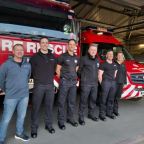
Action on Hearing Loss calling on runners for the Royal Parks Half Marathon
National charity Action on Hearing Loss is urging people to don their running shoes and sign up for the beautifully scenic Royal Parks Half Marathon in London, which takes place on October 8.
For those who are undecided about who to represent in the big race, keep in mind the 11 million people living with some form of hearing loss in the UK, like two-year-old Leo Miles and his mother, Keighley.
Leo has been severely deaf since birth and is currently being considered for a life changing cochlear implant – a technology the charity was instrumental in the development of in the early 1980s.
At just six weeks old Leo woke with a startle to the sound of a clap - the first noise to ever fill his ears.
The baby was fitted with hearing aids by an audiologist while he slept in his mother’s arms at Southend Hospital.
His father, Richard, 34, filmed the touching moment little Leo woke up to the sound before dozing off again as tears of laughter filled the room.
Since Action on Hearing Loss’ successful campaign in 2000 with National Deaf Children’s Society (NDCS), every child born in the UK is screened for hearing loss after birth, usually before they are discharged from the hospital.
Just hours after Leo was born in February 2015, he had an OAE scan (otoacoustic emmisions), but the test came back with no clear response in both ears.
Richard said: “We were informed it was quite common due to some babies having gunk in their ears from being born. We were then asked to return ten days later so they could repeat the test and again a no clear response was recorded.”
The next step was for Leo to undergo an AABR test (Automated Auditory Brainstem Response) where sensors are used to measure the baby’s brainwaves in response to clicking sounds.
It was soon after this that he was diagnosed with Bilateral Severe Sensorineural Loss, caused by damage in the inner ear.
Without aids Leo’s hearing is around the 70 to 80Db, meaning he has little or no access to speech sounds.
Despite his mother, Keighley, living with profound hearing loss, getting Leo to adapt to the hearing aids over the last two years has not been an easy ride for the family.
Keighley, 31, said: “There has been periods of time when we have been pulling our hair out because we couldn’t get the hearing aids to stay in Leo’s ears, or he was out growing the moulds too quickly so they never fitted right. Then he started teething which effected his ears so he would refuse to keep them in.
“But two years on hearing aids are a part of Leo. He asks for them to be put in and cries when we take them out for bedtime which is a stage we never thought we would get to.”
Senior Audiologist at Action on Hearing Loss, Gemma Twitchen, said: “Around one to two babies in 1,000 and around one in 100 babies who have spent at least 48 hours in a special care baby unit, or a neonatal intensive care unit, have a hearing loss in one or both ears.
“Permanent hearing loss impacts heavily on a baby’s development and identifying hearing loss early is vital as it provides the child with a better developing speech and language and social development with the right management. 90% of babies are born into families with no family history of deafness and so screening also means that parents get the right support and advice from the start to support their child.”
Now two years old, Leo recently had a drop in his hearing levels and has been under the care of St Thomas’ Hospital in London where he is being considered for a cochlear implant.
More than 30 years ago, surgeons at the Royal Ear Hospital worked closely with the technical department at Action on Hearing Loss (known then as RNID) to develop the first cochlear implant, a device that simulates sound using electrical signals.
Today the charity continues to fund research to enhance the technology so that the clarity of speech can be improved for its users, while its scientists continue to look for treatment for hearing loss.
If you would like to raise money for the charity and support people living with hearing loss, the deadline to sign up for The Royal Parks Foundation Half Marathon is August 18 and includes a £25 registration fee with a minimum sponsorship of £350.
The Half Marathon is one of the most scenic city runs in the world. With a beautiful 13.1 mile autumnal route through four of London’s magnificent Royal Parks and past some of the capital’s most iconic landmarks, like Buckingham Palace, the Houses of Parliament and the London Eye.
To sign up, go to https://www.actiononhearingloss.org.uk/royalparks.aspx














